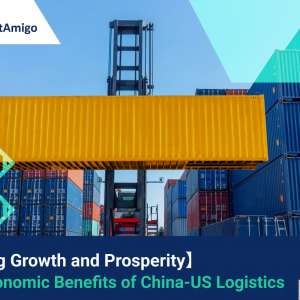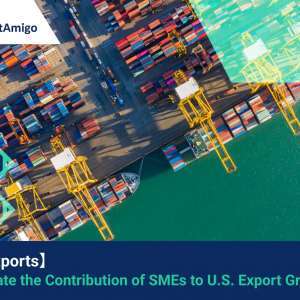Author Name: Tiffany Lee – Marketing Analyst at FreightAmigo
A transformation is sweeping across the logistics industry, driven by a concept known as ESG – Environment, Social, Governance. This trend is reshaping the way companies operate, pushing them towards sustainable growth and ethical business practices. The ESG trend in logistics has emerged as a key factor in the decision-making process of companies, influencing their strategy, operations, and overall performance.
The logistics sector, often criticized for its environmental footprint, is now witnessing a shift towards sustainable practices. The ESG trend is not just about ‘going green’. It’s about demonstrating responsibility and accountability, fostering a culture of transparency, and creating long-term value for all stakeholders.
This blog post aims to explore the ESG trend in logistics, delving into the challenges and opportunities it presents. It will also provide insights on how to leverage ESG as a competitive advantage and envision its future in the logistics sector.
Want To Compare The Best Express, Air Freight, Sea Freight, Rail Freight & Trucking Rates So As To Have Better Control On Cost?
Understanding ESG: Environment, Social, Governance
Before diving into the ESG trend in logistics, it’s essential to understand what ESG stands for. ESG is an acronym for Environment, Social, and Governance, three broad categories or criteria used to evaluate a company’s operations from a sustainability and ethical standpoint.
- Environment: This relates to a company’s impact on the environment, considering factors like waste management, energy use, pollution, and natural resource conservation.
- Social: This refers to the company’s relationships with its employees, suppliers, customers, and the communities where it operates. It covers aspects like human rights, labor standards, diversity, and inclusion.
- Governance: This involves the company’s leadership, executive pay, audits, internal controls, and shareholder rights. It reflects how the company is governed and the level of transparency in its operations.
The ESG trend in logistics aims to incorporate these principles into the core business strategies of logistics companies, driving them towards sustainable and ethical operations.
The Rise of ESG Trend in the Logistics Industry
The logistics industry is increasingly recognizing the importance of ESG. Various factors are fueling the rise of the ESG trend in logistics.
Firstly, there is growing awareness and concern about the environmental impact of logistics operations. This is pushing companies to adopt cleaner, greener, and more efficient practices.
Secondly, social factors like labor rights, workplace safety, and diversity are garnering attention. Companies are realizing that positive social impact can boost their reputation, enhance employee morale, and improve stakeholder relationships.
Thirdly, governance issues like transparency, accountability, and ethical conduct are gaining prominence. Companies are focusing on strengthening their governance structures to build trust and credibility.
Major Challenges in Implementing ESG in Logistics
Despite the growing momentum, implementing the ESG trend in logistics is not without challenges. The logistics sector, with its complex supply chains and energy-intensive operations, faces several hurdles in adopting ESG principles.
One of the major challenges is the lack of standardization in ESG metrics and reporting. This makes it difficult for companies to measure their ESG performance and compare it with others. Another challenge is the high cost of implementing sustainable practices, especially for small and medium-sized enterprises (SMEs). Additionally, there is a need for cultural change within organizations, which requires strong leadership and employee engagement.
Opportunities Presented by the ESG Trend in Logistics
Despite the challenges, the ESG trend in logistics presents several opportunities. By adopting ESG principles, logistics companies can enhance their operational efficiency, reduce costs, and mitigate risks.
ESG can open new markets and create business opportunities. For instance, companies can develop green logistics services to cater to the growing demand for sustainable products and services. They can also leverage ESG to strengthen their brand image and differentiate themselves in a competitive market.
Moreover, ESG can attract investment. Many investors are now considering ESG factors in their investment decisions, and companies with strong ESG performance are likely to attract more capital.
ESG – A Competitive Advantage in Logistics
In today’s business landscape, ESG is more than just a trend – it’s a competitive advantage. Companies that successfully integrate ESG into their strategies can gain an edge over their competitors.
By adopting sustainable practices, companies can reduce their environmental footprint and save costs. By fostering a positive work environment, they can attract and retain talent, enhancing their productivity and performance. By demonstrating good governance, they can build trust and credibility, strengthening their relationships with stakeholders.
In essence, the ESG trend in logistics is not just about doing the right thing – it’s about doing what’s best for business.
Future of ESG Trend in the Logistics Sector
The ESG trend in logistics is here to stay. As environmental, social, and governance issues continue to gain prominence, the pressure on logistics companies to adopt ESG principles will intensify.
In the future, we can expect to see more standardized and transparent ESG reporting in the logistics sector. Technologies like AI, IoT, and blockchain could play a key role in facilitating this. We can also expect to see more innovation in green logistics, driven by advancements in clean energy, electric vehicles, and circular economy models.
Ultimately, the future of logistics will be shaped by companies that not only understand but embrace the ESG trend, turning challenges into opportunities and driving sustainable growth.
How to Embrace the ESG Trend in Your Logistics Company
Embracing the ESG trend in logistics requires a strategic approach. Here are some steps to get started:
- Understand ESG: Educate yourself and your team about ESG and its importance. Develop a clear understanding of what ESG means for your company and how it can be integrated into your business strategy.
- Set Goals: Define your ESG goals and develop a roadmap to achieve them. Ensure that your goals are aligned with your business objectives and stakeholder expectations.
- Implement: Start implementing ESG practices in your operations. This could involve improving energy efficiency, promoting diversity and inclusion, enhancing transparency, and so on.
- Measure and Report: Track your ESG performance and report it to your stakeholders. Use standardized metrics and frameworks to ensure consistency and comparability.
To navigate the ESG trend in logistics and achieve your ESG goals, consider using the services of FreightAmigo. FreightAmigo provides transparent ESG reporting, enabling businesses to measure and communicate their ESG performance effectively. The company also collaborates with ESG-focused organizations to stay updated on industry best practices and drive continuous improvement in ESG risk management.
By integrating ESG considerations into logistics operations, FreightAmigo contributes to overall ESG performance and supports organizations in their commitment to sustainable and responsible business conduct.
There Are Different Options For Cargo Transportation. If You Want To Choose The Most Convenient And Suitable Solution, It Is Best To Have The Full Support Of Logistics Experts! If You Are Planning To Ship Goods Overseas, Please Go To The FreightAmigo Page For Inquiries.
===
Read More:
【Logistics News】Singapore to Sign Declaration on Green Shipping Corridors
FreightAmigo Won Startup Grand Award In TechChallenge — Digitising Trade Finance
Sailing Schedule: Streamlining Logistics Operations for Efficient Shipments
===
If you have any inquiries on logistics/supply chain, feel free to contact FreightAmigo now:
Chat with us online OR
Phone : +852 28121686
WhatsApp: +852 27467829









































